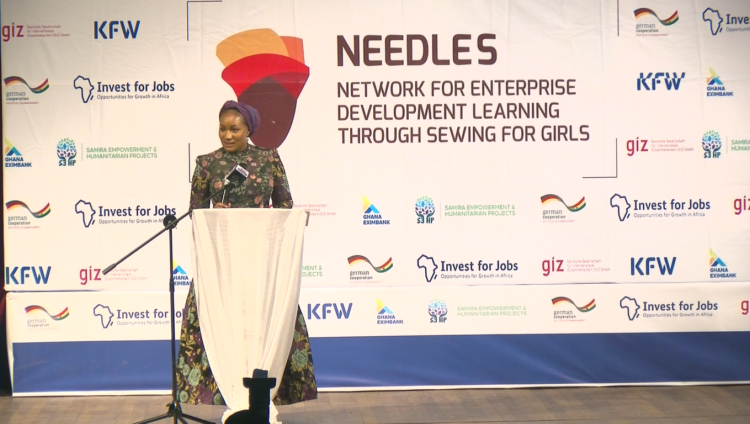Following the launch of the Network for Enterprise Development Learning through Sewing (NEEDLES) for Girls – (N4G) project in Tamale on May 26, 2021, amidst a career day event, 654 girls have successfully completed the training.
This is out of 850 girls were selected from 1,500 girls who registered for the project.
Through the collaboration of the Samira Empowerment and Humanitarian Project (SEHP) and the Ghana Export and Import Bank (EXIMBANK), the N4G project sought to address the lack of qualified staff needed in the fashion space in Ghana whilst empowering young and vulnerable girls with employable and entrepreneurial skills.
The N4G project was implemented with support from Invest for Jobs, an initiative of the German Federal Ministry for Economic Cooperation and Development (BMZ). Invest for Jobs is the brand for the Special Initiative on Training and Job Creation, implemented among others by the Deutsche Gesellschaft für Internationale Zusammenarbeit (GIZ) GmbH.
Ghana’s textile industry provides huge potential for more value addition and employment opportunities for young women. However, many fashion, garment manufacturing, and beauty firms are micro-sized and small businesses that are characterized by inefficient operational skills, insufficient employee training, poor skills upgrading, rudimentary equipment, and delays in adopting new technology.
Beyond this, established fashion/textile companies are confronted with a lack of skilled workers considering the training programmes of vocational institutions lack the orientation towards industry needs, which also reflects the poor quality of products made available to consumers.
Thus, the N4G project provides a direct response to the skills gap challenges faced by Ghana’s fashion, textile, and beauty industries. Additionally, the initiative is underpinned by the idea of providing underprivileged young females with vocational and employable skills and financial independence to find formal employment in private companies or to set-up their own micro, small and medium-sized businesses (MSMEs) within the fashion industry in Ghana.
Addressing the audience at the ceremony, the Second Lady, Her Excellency, Mrs. Samira Bawumia, who is also the Founder of the SEHP, stated that “we are here today because we believed in and understood the importance of women’s economic empowerment specifically through skills training and capacity building and its importance to the progress of any society.”
According to her, the potential of the fashion, textile, garment, and beauty sectors presents the opportunity to groom these girls with skills that will set them up for an improved standard of living. Rounding up her speech, the Second Lady called on institutions, including those in the private sector, that support the development of underprivileged girls.
The Team Leader of the Invest for Jobs, John Duti, in his welcome address, hinted that the overall project objective is to improve the livelihoods of over 2,000 underprivileged females through fashion-related vocational training and enterprise development and to produce qualified ‘fashionpreneurs’ for the fashion industry in this pilot phase.
Mr. Duti explained that the beneficiaries of the N4G project are mainly underprivileged females who have migrated from their home villages/districts into regional capitals in search of economic activities, with no prior work experience in fashion-related trades.
“The N4G project is currently moving to Takoradi and Bolgatanga and will be upscaled to all the 16 regions of Ghana to ensure we have qualified, well-trained workers in Ghana’s fashion, textile, and beauty industries as we create more jobs for our young women,” stated Mr. Duti.
On his part, Lawrence Agyinsam, the Chief Executive of EXIMBANK, expressed his delight to have partnered on the N4G project and assured EXIMBANK’s support in the next phase of the project as the objectives of N4G are in line with the bank’s corporate values.
Under the Invest for Jobs brand, the German Federal Ministry for Economic Cooperation and Development (BMZ) has put together a package of measures to support German, European and African companies in investment activities that have a high impact on employment in Africa. The Special Initiative on Training and Job Creation – the official title – offers comprehensive advice, contacts and financial support to overcome investment barriers.


Comments are closed.